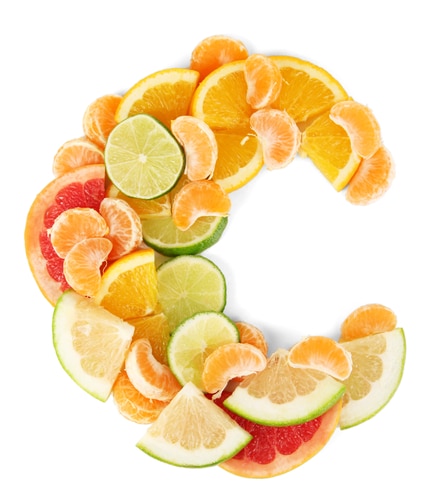
Vitamin A
Also known by its chemical name retinol, Vitamin A is found in various fruits and vegetables such as carrots, spinach, broccoli, and various other leafy vegetables. Vitamin is important for your vision and for your skin, bones, and teeth. It also plays an important part in the human reproductive system and the immune system. A severe deficiency can lead to night-blindness and hyperkeratosis.
Vitamin B1
Vitamin B1, or thiamine, is important for the function of nerves and for metabolism. It is found in significant amounts in pork, many vegetables and various fruits such as tomatoes and watermelons. Other sources include liver and eggs. A deficiency leads to various medical complications including memory problems, confabulation and a variety of metabolism-related issues.
Vitamin B2
Riboflavin is found in many leafy vegetables as well as in mushrooms, dairy products, and shellfish. It is important for the health of your skin, vision, and metabolism. A deficiency can lead to a medical condition known as ariboflavinosis the symptoms of which include skin problems and decreased number of red blood cells.
Vitamin B3
Known as niacin, vitamin B3 is found in lean meats such as poultry breasts and lean beef or in various seafood such as shrimp and tuna. It is also found in potatoes, tomatoes, and spinach among other fruits and vegetables. Vitamin B3 is also important for metabolism as well as skin health and nervous system. In addition, it also plays a significant role in the human digestive system. A severe deficiency may lead to pellagra which comes with symptoms including skin conditions and mental problems.
Vitamin B5
Pantothenic acid is most commonly found in meat and eggs as well as whole-grain cereals and a few fruits including the avocado. This vitamin is important for the body’s cellular processes and the way in which it handles fat. While extremely rare, a deficiency can lead to paraesthesia among other medical complications.
Vitamin B6
With the chemical name of pyridoxine, vitamin B6 is an amino acid and it important for dealing with body fat and the production of red blood cells. It is found in a wide variety of fruit and vegetables including potatoes, tomatoes, spinach, bananas, and rice. A deficiency can lead to anemia.
Vitamin B7
Biotin is also important for the body’s metabolism as well as for the synthesis of fat and glycogen. It is found in numerous fruits and vegetables, egg yolks and liver. A deficiency can lead to skin problems such as dermatitis.
Vitamin B9
Folic acid, also known as folate, is important for the synthesis of DNA and the formation of new cells. Folate is found in the vast majority of green vegetables although most significant supplies come from vegetables such as asparagus, green beans, and broccoli.
Vitamin B12
Important for the synthesis of new cells, vitamin B12 is found in all meat and fish as well as dairy products and shellfish. A number one source of vitamin B12 is milk. B12 has various different chemical names. A deficiency may lead to skin problems including an acne-like rash.
Vitamin C
Ascorbic acid is one of the most important vitamins required by the human body. Some mammals, however, such as dogs, don’t need it at all. People who have a deficiency of this vitamin will eventually develop scurvy –a once extremely common disease among sailors who had no access to important sources of the vitamin. Most fruits and vegetables are rich in vitamin C with some of the most important sources including kiwis, citrus fruits and tomatoes.
Vitamin D
Essential for the bone structure of the human body, vitamin D comes from eating meat, fish, dairy products and mushrooms. Unlike the other vitamins, vitamin D is also synthesized in the human body due to sunlight. Those who have a deficiency in this vitamin risk developing rickets, a disease characterized by softened bones resulting in movement and growth problems.
Vitamin E
Chemicals known as tocopherols form the vitamin E category. The vitamin is found in certain plant oils, avocados, various fish, shrimp, and wheat. It is important for the cells, and it is an antioxidant. Vitamin E is widely found in adequate amounts, hence a deficiency in it is extremely rare.
Vitamin K
Found in leafy green vegetables, eggs, and liver, in particular, vitamin K is important for the blood. It synthesizes blood-clotting proteins and regulates the amount of calcium in the bloodstream. A deficiency can lead to an increased risk of hemorrhaging.
Related Articles By Cathe:
Why Athletes and Older People Need More Dietary Zinc
A Practical Guide to Essential Dietary Minerals and their Food Sources
Exercise and Anemia: If You Work Out Do You Need More Iron?
4 Common Nutritional Deficiencies Most People Don’t Know They Have
Do You Need More of Certain Vitamins as You Age?
Buyer’s Guide to Amino Acid Supplements
Vitamins, Minerals, & Athletic Performance: Which Micronutrients Are of Greatest Concern?

